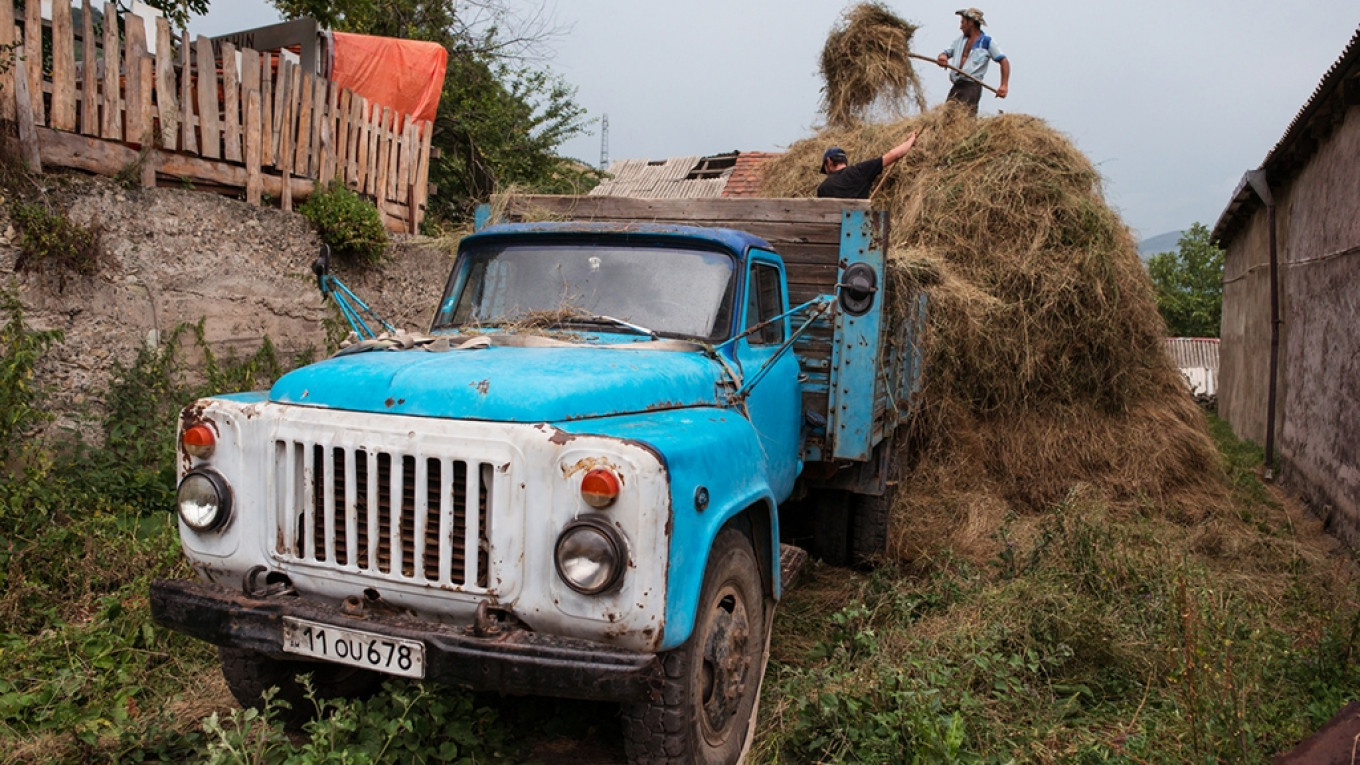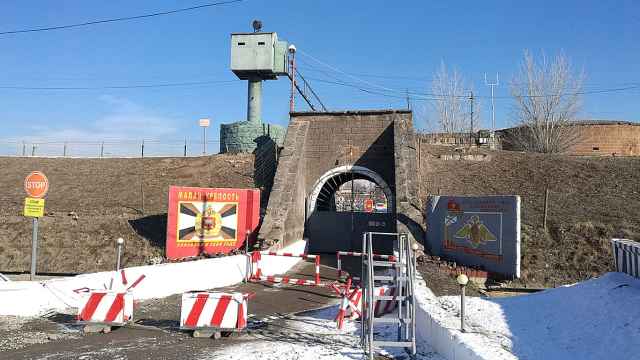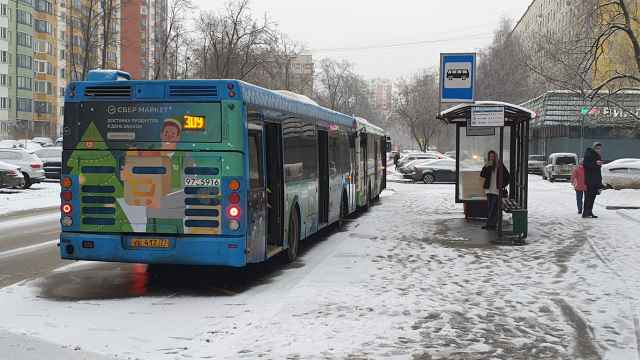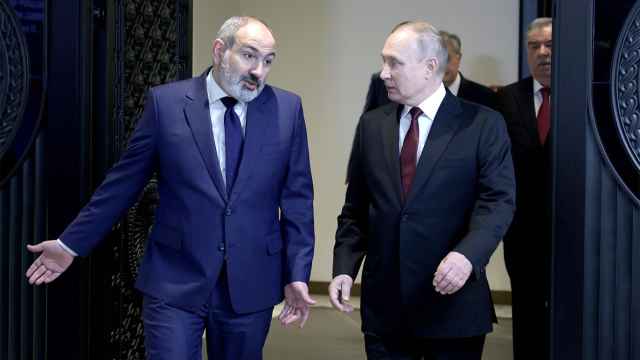Despairing of the economic options in her home country, Marine Khachatryan found work at a flower shop in Moscow’s outskirts in 2020, while her husband got work in construction.
But then came the invasion of Ukraine, which has resulted in punishing Western sanctions and a crisis in Russia’s economy.
“We came here to make money and up until the war, we were fine. Now, nobody wants to buy flowers and the owner [of the shop] keeps losing money,” said Khachatryan. “I thought about trying to get another job, but Russia is getting more expensive.” So instead she has decided to move back to Armenia. “It’s a nightmare. I can go back to working in beauty salons, but I don’t know what my husband will do.”
Every year, tens of thousands of Armenians — especially men from smaller towns and villages — travel to Russia for seasonal labor, particularly in construction.
Estimates of exact numbers vary widely. Armenia itself reports that about 80,000 go to Russia for seasonal work every year. But Russian data puts the figure at 300,000, which would be more than 10% of Armenia’s population.
Unknown numbers of other recent migrants from Armenia live in Russia more permanently, some even gaining Russian citizenship, but still send money back to family in Armenia, a critical part of the country’s economy.
In 2021, remittances from Russia amounted to $865 million, according to Armenia’s central bank. That was equivalent to nearly 5% of the country’s GDP.
That figure is now set to drop dramatically. “It could be up to a 40% decrease,” Finance Minister Tigran Khachatryan told the Armenian state news agency on March 28.
Armenian labor migrants say that many jobs in Russia are disappearing, and in the ones that remain, the salaries – once converted to Armenian drams – are unpredictable. In the early days of Russia’s invasion and the sanctions that were swiftly imposed in retaliation, the ruble lost half its value, though it has since recovered.
“Salaries have shrunk, and it’s possible that employers are not going to be able to pay at all,” said Tatevik Bezhanyan, an expert on migration at the charity group Armenian Caritas. “For now they can still pay, but if the situation doesn’t get better there definitely are going to be issues,” she told Eurasianet.
Remittances “are likely to decline with weaker economic activity in Russia, the depreciating ruble, and restrictions on financial flows from Russia,” the World Bank said in a report last month. “Under a more severe contraction in Russia, many migrants may be forced to return to Armenia putting pressure on labor markets and fiscal spending.”
Before Russia’s invasion of Ukraine, the World Bank had projected Armenian GDP growth of 5.3% in 2022. Now it’s revised that down to 1.2%.
Russia has not released figures so far this year measuring migrant flows and how they might have changed. Usually the Interior Ministry publishes data by April, but this year the release is late, Bezhanyan said. “My Russian colleagues say that there is just a big outflow out of Russia and so maybe they are being cautious about this,” she said.
Seasonal migrant laborers typically start arriving in Russia in March, when the weather begins to allow construction work. So it is still early to judge the impact of the new situation on labor migration, but Bezhanyan said that initial indications are not good.
“We have already received notices that employers are having difficulties paying,” she said. One practice employers have been trying, in order to save money, is to ask workers to work off the books. “But we always advise not to agree to that, since it can result in getting deported. And if there is no contract specifying the amount of the salary, they can forget about getting paid. We have already been seeing problems like this.”
Arsen, a construction worker (who asked that his last name not be used), has been working in Russia’s Urals region since February.
“When the ruble collapsed we talked to our foreman, since we would be making half of what we were getting before,” he said. “After two weeks, they told us that we could get higher pay if we terminated our contracts and worked off the books. We did it, and now we haven’t been paid in two months.”
Because of international financial sanctions against Russia, transferring money back home also is more difficult, with the Russian Zolotaya Korona service now the only option for sending money to Armenia and new restrictions on the amounts that can leave Russia.
As a result, many regular migrants are staying home this year. “Some found jobs here and are not complaining about the pay, given the costs in Russia. They can live in their houses in Armenia and see no reason to go to Russia,” Bezhanyan said.
So far, the Armenian government has only come up with an indirect way to address the issue. Prime Minister Nikol Pashinyan has introduced a proposal to boost the construction sector by offering subsidized loans for home renovations that include improving energy efficiency.
“Due to well-known circumstances, uncertainties have arisen regarding our citizens going abroad for work,” he said at аn April 15 cabinet meeting. “We have decided to launch a state program, within the framework of which we offer citizens to take subsidized loans to rebuild their apartments. […] We hope that with this we will make a significant contribution to housing, the economy, small business, and poverty alleviation.”
Bezhanyan is skeptical. “This is definitely an indirect approach,” she said. “It’s clear that these people see the danger [in staying in Russia] and they are creating a foundation for themselves to be able to move to Armenia, but we need to take steps so they don't come back to Armenia and then leave for another country. There has to be a more systematic approach.”
This story was first published by Eurasianet.org.
A Message from The Moscow Times:
Dear readers,
We are facing unprecedented challenges. Russia's Prosecutor General's Office has designated The Moscow Times as an "undesirable" organization, criminalizing our work and putting our staff at risk of prosecution. This follows our earlier unjust labeling as a "foreign agent."
These actions are direct attempts to silence independent journalism in Russia. The authorities claim our work "discredits the decisions of the Russian leadership." We see things differently: we strive to provide accurate, unbiased reporting on Russia.
We, the journalists of The Moscow Times, refuse to be silenced. But to continue our work, we need your help.
Your support, no matter how small, makes a world of difference. If you can, please support us monthly starting from just $2. It's quick to set up, and every contribution makes a significant impact.
By supporting The Moscow Times, you're defending open, independent journalism in the face of repression. Thank you for standing with us.
Remind me later.






